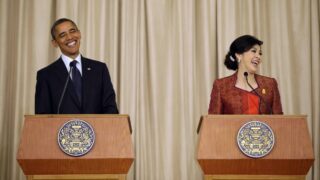Thailand’s opposition is restive but a coup seems unlikely and the business climate could improve

Thailand is on the alert. Anti-government protestors look set to hit the streets of the capital Bangkok in droves tomorrow. The Thai cabinet has invoked a security law it uses during times of unrest giving it powers to close roads and seal off buildings. And there are dark mutterings about an alleged plot to kidnap foreign investment-friendly Prime Minister Yingluck Shiniwatra.
Thailand has played host to around 20 coups or coup attempts since 1932. But tomorrow’s event is unlikely to be another one.
“I doubt there will be a coup,” says Steve Vickers, CEO of Asian risk consultancy Steve Vickers & Associates. “The threat profile is medium, not high. There are things we cannot predict, like what the police reaction will be tomorrow. But otherwise I’d say all this shows is that the opposition are alive and well and feeling emboldened.”
Thailand’s Constitution Court has rejected petitions to stop the rally, saying it did not believe it was an attempt to overthrow the government.
But the rise of Pitak Siam, the brand new opposition party that has organised tomorrow’s protests, seems worrying. Yingluck was elected in a landslide victory 16 months ago which ushered in a mood of reconciliation after several years of unrest. She is the younger sister of former leader and telecoms tycoon Thaksin Shiniwatra. He was toppled in a military coup in 2006 and then found guilty of corruption over some land deals, but was popular with international companies and banks.
Run by mysterious retired general Boonlert Kaewprasit, Pitak Siam is part of the broad opposition group known as “yellow shirts” whose rallies led to Thaksin’s downfall. Pitak Siam has confidently predicted half a million Thais will turn out for tomorrow’s event. Thai police have predicted a turnout of 70,000, but will deploy 17,000 officers just in case.
The yellow shirts are mostly middle- and upper-class Bangkok residents who support the military and call themselves monarchists but are better defined as nationalists. They identify heavily with Thailand’s old and frail King Bhumibol (yellow is the colour of royalty in Thailand, and in the days leading up to the 2006 coup in Bangkok, many office workers in the capital swapped their shirts and ties for yellow polo tops.)
The yellow shirts are not loved by foreign investors. Thaksin—whose supporters wear red shirts during rallies—promoted liberal foreign ownership policies and presided over a major infrastruture building projects. His policies, dubbed “Thaksinomics,” also included cheap health care, debt relief and micro-loans for female-run businesses, to lift the rural poor above the poverty line. His government ran a surplus most years and he built up large currency reserves.
The monarchist generals who toppled Thaksin were fans of what Thais call the “sufficiency economy” (pdf.) Championed by King Bhumibol in reaction to the 1997 crisis when Thailand defaulted on foreign debt, this theory is inward looking and says Thailand should reduce its reliance on exports and step back from globalization in favor of a localized economy. So when the tanks rolled into Bangkok for the 2006 coup, investor confidence plunged for more reasons than just the upheaval. And it has not yet recovered. The pro-Thaksin People’s Power Party replaced the military in 2008. But in 2010, Thailand’s foreign direct investment was under half of the 2005 figure, according to Bank of Thailand data. A survey carried out by Morgan Stanley earlier this year showed just 37% of companies present in Thailand planned to increase their investments there, with the rest likely to reduce or maintain what they already had.
There are green shoots of optimism for business though. Forecasting a return to the heady days of Thaksinomics, Thailand’s benchmark SET index has jumped 31% in the last 12 months. Yingluck has so far failed to boost her nation’s export industry. But she wants to. She is also planning $70 billion of infrastructure investments. As she signalled in these shots of her chumming around with US President Barack Obama and clinking champagne flutes with Secretary of State Hillary Clinton, Thailand is jumping right back onto the global stage.
Still, the country clearly needs more stability before multinationals pump money in. Any more fighting between the red and yellow factions could sweep confidence away.
That would be a shame, as there is an even more worrying political event looming. Thailand’s King Bhumibol, who is in his 80s and in frail health, will at some point pass away. Most Thais, no matter what the color of their shirts, worship him. It is even an acceptable custom to claim he invented any number of modern technologies, from airplanes to combine harvesters. (He was awarded a patent for an artificial rain-making technique back in 2003.)
US Embassy cables that were part of the trove released by Wikileaks in 2009 speculated the King’s passing could cause massive disruption and even the next coup. When he goes, the already rocky relationship between the Shiniwatras and the generals could descend into red- and yellow- striped chaos. But if tomorrow’s protests really are peaceful, Thailand could well become a better investment environment before it gets worse.
